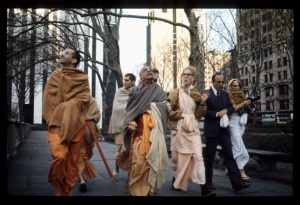SB 4.23.6: Difference between revisions
m (1 revision(s)) |
No edit summary |
||
| Line 1: | Line 1: | ||
{{info | {{info | ||
|speaker=Maitreya | |speaker=Maitreya Ṛṣi | ||
|listener=Vidura | |listener=Vidura | ||
}} | }} | ||
[[Category:Srimad-Bhagavatam - Canto 04 Chapter 23|s06 ]] | |||
[[Category:Bhagavatam Verses Spoken by Maitreya Rsi - Vanisource|042306]] | |||
<div style="float:left">'''[[Srimad-Bhagavatam]] - [[SB 4|Fourth Canto]] - [[SB 4.23: Maharaja Prthu's Going Back Home|Chapter 23: Mahārāja Pṛthu's Going Back Home]]'''</div> | |||
<div style="float:right">[[File:Go-previous.png|link=SB 4.23.5]] '''[[SB 4.23.5]] - [[SB 4.23.7]]''' [[File:Go-next.png|link=SB 4.23.7]]</div> | |||
{{RandomImage}} | |||
==== TEXT 6 ==== | ==== TEXT 6 ==== | ||
<div | <div class="verse"> | ||
grīṣme pañca-tapā vīro | :grīṣme pañca-tapā vīro | ||
varṣāsv āsāraṣāṇ muniḥ | :varṣāsv āsāraṣāṇ muniḥ | ||
ākaṇṭha-magnaḥ śiśire | :ākaṇṭha-magnaḥ śiśire | ||
udake sthaṇḍile-śayaḥ | :udake sthaṇḍile-śayaḥ | ||
</div> | </div> | ||
| Line 16: | Line 22: | ||
==== SYNONYMS ==== | ==== SYNONYMS ==== | ||
<div | <div class="synonyms"> | ||
''grīṣme''—in the summer season; ''pañca-tapāḥ''—five kinds of heating; ''vīraḥ''—the hero; ''varṣāsu''—in the rainy season; ''āsāraṣāṭ''—being situated within the torrents of rain; ''muniḥ''—like the great sages; ''ākaṇṭha''—up to the neck; ''magnaḥ''—drowned; ''śiśire''—in winter; ''udake''—within water; ''sthaṇḍile-śayaḥ''—lying down on the floor. | |||
</div> | </div> | ||
| Line 23: | Line 29: | ||
==== TRANSLATION ==== | ==== TRANSLATION ==== | ||
<div | <div class="translation"> | ||
Following the principles of forest living and the footsteps of the great sages and munis, Pṛthu Mahārāja accepted five kinds of heating processes during the summer season, exposed himself to torrents of rain in the rainy season and, in the winter, stood in water up to his neck. He also used to simply lie down on the floor to sleep. | Following the principles of forest living and the footsteps of the great sages and munis, Pṛthu Mahārāja accepted five kinds of heating processes during the summer season, exposed himself to torrents of rain in the rainy season and, in the winter, stood in water up to his neck. He also used to simply lie down on the floor to sleep. | ||
</div> | </div> | ||
| Line 30: | Line 36: | ||
==== PURPORT ==== | ==== PURPORT ==== | ||
<div | <div class="purport"> | ||
These are some of the austerities executed by the jñānīs and yogīs, who cannot accept the process of bhakti-yoga. They must undergo such severe types of austerity in order to become purified from material contamination. pañca-tapāḥ refers to five kinds of heating processes. One is enjoined to sit within a circle of fire, with flames blazing from four sides and the sun blazing directly overhead. This is one kind of pañca-tapāḥ recommended for austerity. Similarly, in the rainy season one is enjoined to expose himself to torrents of rain and in winter to sit in cold water up to the neck. As far as bedding is concerned, the ascetic should be content with simply lying on the floor. The purpose for undergoing such severe austerities is to become a devotee of the Supreme Personality of Godhead, Kṛṣṇa, as explained in the next verse. | These are some of the austerities executed by the ''jñānīs'' and ''yogīs'', who cannot accept the process of ''bhakti-yoga''. They must undergo such severe types of austerity in order to become purified from material contamination. ''pañca-tapāḥ'' refers to five kinds of heating processes. One is enjoined to sit within a circle of fire, with flames blazing from four sides and the sun blazing directly overhead. This is one kind of ''pañca-tapāḥ'' recommended for austerity. Similarly, in the rainy season one is enjoined to expose himself to torrents of rain and in winter to sit in cold water up to the neck. As far as bedding is concerned, the ascetic should be content with simply lying on the floor. The purpose for undergoing such severe austerities is to become a devotee of the Supreme Personality of Godhead, Kṛṣṇa, as explained in the next verse. | ||
</div> | </div> | ||
__NOTOC__ | |||
<div style="float:right; clear:both;">[[File:Go-previous.png|link=SB 4.23.5]] '''[[SB 4.23.5]] - [[SB 4.23.7]]''' [[File:Go-next.png|link=SB 4.23.7]]</div> | |||
__NOTOC__ | |||
__NOEDITSECTION__ | |||
Revision as of 11:06, 26 May 2021

A.C. Bhaktivedanta Swami Prabhupada
TEXT 6
- grīṣme pañca-tapā vīro
- varṣāsv āsāraṣāṇ muniḥ
- ākaṇṭha-magnaḥ śiśire
- udake sthaṇḍile-śayaḥ
SYNONYMS
grīṣme—in the summer season; pañca-tapāḥ—five kinds of heating; vīraḥ—the hero; varṣāsu—in the rainy season; āsāraṣāṭ—being situated within the torrents of rain; muniḥ—like the great sages; ākaṇṭha—up to the neck; magnaḥ—drowned; śiśire—in winter; udake—within water; sthaṇḍile-śayaḥ—lying down on the floor.
TRANSLATION
Following the principles of forest living and the footsteps of the great sages and munis, Pṛthu Mahārāja accepted five kinds of heating processes during the summer season, exposed himself to torrents of rain in the rainy season and, in the winter, stood in water up to his neck. He also used to simply lie down on the floor to sleep.
PURPORT
These are some of the austerities executed by the jñānīs and yogīs, who cannot accept the process of bhakti-yoga. They must undergo such severe types of austerity in order to become purified from material contamination. pañca-tapāḥ refers to five kinds of heating processes. One is enjoined to sit within a circle of fire, with flames blazing from four sides and the sun blazing directly overhead. This is one kind of pañca-tapāḥ recommended for austerity. Similarly, in the rainy season one is enjoined to expose himself to torrents of rain and in winter to sit in cold water up to the neck. As far as bedding is concerned, the ascetic should be content with simply lying on the floor. The purpose for undergoing such severe austerities is to become a devotee of the Supreme Personality of Godhead, Kṛṣṇa, as explained in the next verse.